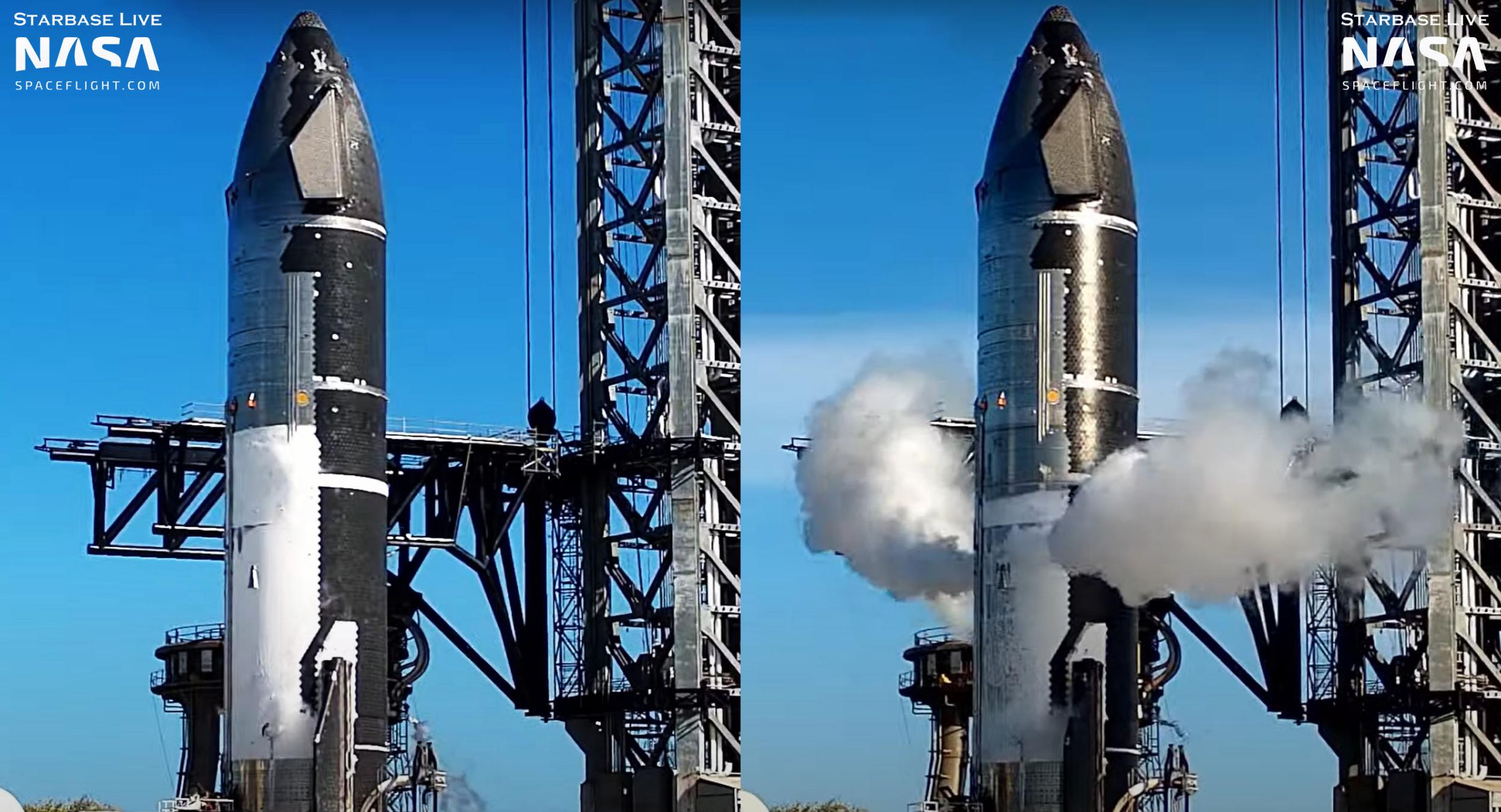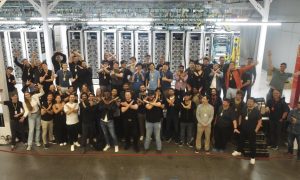

News
SpaceX’s upgraded Starship passes first ‘cryoproof’ test after repairs
SpaceX CEO Elon Musk says an upgraded Starship prototype has passed its first cryogenic proof or ‘cryoproof’ test after undergoing a week of repairs.
Around noon, local sheriffs closed the road to Starbase’s orbital launch site (OLS) and SpaceX cleared the pad of all personnel, freeing up Starship S24 for the next stage of testing. A week prior, on May 27th, Ship 24 suffered some degree of internal damage during a simpler pneumatic proof test with ambient-temperature nitrogen gas. It’s now clear that most of that pneumatic proof test was successful, demonstrating that the Starship’s main propellant tanks and associated plumbing and valves were structurally sound and working as expected.
Still, for about a week after that first test, teams of SpaceX workers swarmed the Starship prototype 24/7 and were seen extracting damaged plumbing and carefully transporting replacement parts inside. Only on the morning of June 2nd was Ship 24 sealed up again.
Cryogenic fluid loading – liquid nitrogen or a combo of LN2 and liquid oxygen (LOx) – began shortly before 3pm CDT (UTC-5) and the Starship’s main tanks were fully filled about 70 minutes later. SpaceX then let those fluids naturally warm, causing a small portion to boil into gas and gradually raise the pressure inside Ship 24’s main tanks. As the pressure grew, sections of the layers of frost and ice that formed on the outside of its thin steel tanks occasionally sloughed off in sheets or broke off in fragments – the only evidence of stress aside from venting.
After about an hour fully filled, SpaceX began detanking and depressurizing Ship 24. The road and pad were reopened around 8:40 pm. All told, aside from an apparent leak on its liquid oxygen tank access hatch, a very common occurrence, Ship 24 exhibited no unusual behavior and made it through its first cryoproof without any obvious issue. More importantly, SpaceX did not appear to reattempt the pneumatic proof test the ship partially failed before the harder cryoproof test, implying that its first test was mostly successful. CEO Elon Musk later confirmed that the Starship had passed its first cryoproof test a few hours after.
Despite Musk’s positive comment, there was no evidence of activity in Ship 24’s nose section, where a number of crucial vents and secondary header tanks – meant to serve as attitude control thrusters and store landing propellant – are located. Ship 24 is the first Starship prototype with a new design that moved both header tanks into the tip of the nosecone. The nose itself is also the first with a number of other manufacturing and design upgrades to reach a test stand, so verifying that it works as expected is doubly important.
Given that the plumbing that failed in the first test may have been connected to Ship 24’s nose section and header tanks and that neither was obviously involved in the subsequent June 2nd cryoproof, it’s likely that the Starship prototype is not done with cryoproof testing just yet. Nonetheless, the ship’s survival and passage of its first cryoproof bodes well for the next steps.
In the near future, SpaceX is expected to move Ship 24 to a nearby ‘suborbital pad’ and test stand that has been significantly modified to simulate the thrust and mechanical stress of six Raptor 2 engines. If or when Ship 24 passes that test or tests, SpaceX will likely remove the stand’s hydraulic rams and begin installing Raptor engines and associated heat shielding. Then, Starship S24 can enter the final stages of qualification: wet dress rehearsal and static fire testing.
SpaceX has requested additional road closures for potential testing on June 6th, 7th, and 8th.
News
Tesla launches in India with Model Y, showing pricing will be biggest challenge
Tesla finally got its Model Y launched in India, but it will surely come at a price for consumers.

Tesla has officially launched in India following years of delays, as it brought its Model Y to the market for the first time on Tuesday.
However, the launch showed that pricing is going to be its biggest challenge. The all-electric Model Y is priced significantly higher than in other major markets in which Tesla operates.
On Tuesday, Tesla’s Model Y went up for sale for 59,89,000 rupees for the Rear-Wheel Drive configuration, while the Long Range Rear-Wheel Drive was priced at 67,89,000.
This equates to $69,686 for the RWD and $78,994 for the Long Range RWD, a substantial markup compared to what these cars sell for in the United States.
🚨 Here’s the difference in price for the Tesla Model Y in the U.S. compared to India.
🚨 59,89,000 is $69,686
🚨 67,89,000 is $78,994 pic.twitter.com/7EUzyWLcED— TESLARATI (@Teslarati) July 15, 2025
Deliveries are currently scheduled for the third quarter, and it will be interesting to see how many units they can sell in the market at this price point.
The price includes tariffs and additional fees that are applied by the Indian government, which has aimed to work with foreign automakers to come to terms on lower duties that increase vehicle cost.
Tesla Model Y seen testing under wraps in India ahead of launch
There is a chance that these duties will be removed, which would create a more stable and affordable pricing model for Tesla in the future. President Trump and Indian Prime Minister Narendra Modi continue to iron out those details.
Maharashtra Chief Minister Devendra Fadnavis said to reporters outside the company’s new outlet in the region (via Reuters):
“In the future, we wish to see R&D and manufacturing done in India, and I am sure at an appropriate stage, Tesla will think about it.”
It appears to be eerily similar to the same “game of chicken” Tesla played with Indian government officials for the past few years. Tesla has always wanted to enter India, but was unable to do so due to these import duties.
India wanted Tesla to commit to building a Gigafactory in the country, but Tesla wanted to test demand first.
It seems this could be that demand test, and the duties are going to have a significant impact on what demand will actually be.
Elon Musk
Tesla ups Robotaxi fare price to another comical figure with service area expansion
Tesla upped its fare price for a Robotaxi ride from $4.20 to, you guessed it, $6.90.

Tesla has upped its fare price for the Robotaxi platform in Austin for the first time since its launch on June 22. The increase came on the same day that Tesla expanded its Service Area for the Robotaxi ride-hailing service, offering rides to a broader portion of the city.
The price is up from $4.20, a figure that many Tesla fans will find amusing, considering CEO Elon Musk has used that number, as well as ’69,’ as a light-hearted attempt at comedy over the past several years.
Musk confirmed yesterday that Tesla would up the price per ride from that $4.20 point to $6.90. Are we really surprised that is what the company decided on, as the expansion of the Service Area also took effect on Monday?
But the price is now a princely $6.90, as foretold in the prophecy 😂
— Elon Musk (@elonmusk) July 14, 2025
The Service Area expansion was also somewhat of a joke too, especially considering the shape of the new region where the driverless service can travel.
I wrote yesterday about how it might be funny, but in reality, it is more of a message to competitors that Tesla can expand in Austin wherever it wants at any time.
Tesla’s Robotaxi expansion wasn’t a joke, it was a warning to competitors
It was only a matter of time before the Robotaxi platform would subject riders to a higher, flat fee for a ride. This is primarily due to two reasons: the size of the access program is increasing, and, more importantly, the service area is expanding in size.
Tesla has already surpassed Waymo in Austin in terms of its service area, which is roughly five square miles larger. Waymo launched driverless rides to the public back in March, while Tesla’s just became available to a small group in June. Tesla has already expanded it, allowing new members to hail a ride from a driverless Model Y nearly every day.
The Robotaxi app is also becoming more robust as Tesla is adding new features with updates. It has already been updated on two occasions, with the most recent improvements being rolled out yesterday.
Tesla updates Robotaxi app with several big changes, including wider service area
News
Tesla Model Y and Model 3 dominate U.S. EV sales despite headwinds
Tesla’s two mainstream vehicles accounted for more than 40% of all EVs sold in the United States in Q2 2025.

Tesla’s Model Y and Model 3 remained the top-selling electric vehicles in the U.S. during Q2 2025, even as the broader EV market dipped 6.3% year-over-year.
The Model Y logged 86,120 units sold, followed by the Model 3 at 48,803. This means that Tesla’s two mainstream vehicles accounted for 43% of all EVs sold in the United States during the second quarter, as per data from Cox Automotive.
Tesla leads amid tax credit uncertainty and a tough first half
Tesla’s performance in Q2 is notable given a series of hurdles earlier in the year. The company temporarily paused Model Y deliveries in Q1 as it transitioned to the production of the new Model Y, and its retail presence was hit by protests and vandalism tied to political backlash against CEO Elon Musk. The fallout carried into Q2, yet Tesla’s two mass-market vehicles still outsold the next eight EVs combined.
Q2 marked just the third-ever YoY decline in quarterly EV sales, totaling 310,839 units. Electric vehicle sales, however, were still up 4.9% from Q1 and reached a record 607,089 units in the first half of 2025. Analysts also expect a surge in Q3 as buyers rush to qualify for federal EV tax credits before they expire on October 1, Cox Automotive noted in a post.
Legacy rivals gain ground, but Tesla holds its commanding lead
General Motors more than doubled its EV volume in the first half of 2025, selling over 78,000 units and boosting its EV market share to 12.9%. Chevrolet became the second-best-selling EV brand, pushing GM past Ford and Hyundai. Tesla, however, still retained a commanding 44.7% electric vehicle market share despite a 12% drop in in Q2 revenue, following a decline of almost 9% in Q1.
Incentives reached record highs in Q2, averaging 14.8% of transaction prices, roughly $8,500 per vehicle. As government support winds down, the used EV market is also gaining momentum, with over 100,000 used EVs sold in Q2.
Q2 2025 Kelley Blue Book EV Sales Report by Simon Alvarez on Scribd
-

 News3 days ago
News3 days agoTesla debuts hands-free Grok AI with update 2025.26: What you need to know
-

 Elon Musk6 days ago
Elon Musk6 days agoxAI launches Grok 4 with new $300/month SuperGrok Heavy subscription
-

 Elon Musk1 week ago
Elon Musk1 week agoElon Musk confirms Grok 4 launch on July 9 with livestream event
-

 News2 weeks ago
News2 weeks agoTesla Model 3 ranks as the safest new car in Europe for 2025, per Euro NCAP tests
-

 Elon Musk2 weeks ago
Elon Musk2 weeks agoxAI’s Memphis data center receives air permit despite community criticism
-

 News5 days ago
News5 days agoTesla begins Robotaxi certification push in Arizona: report
-

 Elon Musk2 weeks ago
Elon Musk2 weeks agoTesla reveals it is using AI to make factories more sustainable: here’s how
-

 Elon Musk2 weeks ago
Elon Musk2 weeks agoTesla scrambles after Musk sidekick exit, CEO takes over sales
















